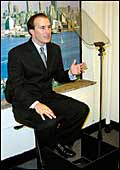 |
|
Hardhat buzz: Civil engineers like
Punj Lloyd's Dhananjayan are back in action
|
It's
back. Classic dusty-at-the-site engineering, blueprints rolled under
the arm and calculus buzzing around in heads under hardhats. It's
back. It's civil. And it's tangible. Engineers, as a tribe, were
in danger of banishment to midnight computer cubicles, with their
output etched in silicon. Now, they're getting back under the clear
light of day-building bridges, erecting towers, spanning flyovers,
laying roads and electrifying cities. In short, doing the heroic
things people grew up hearing them do. "The post-independence
kind of demand for civil and electrical engineers is back,"
explains Vinayak Chatterjee, Chairman of Feedback Ventures, an infrastructure
firm.
Project Pride
If a career in engineering sans the 'computer'
prefix has been so unfashionable, blame state control of infrastructure
and the pain any good brain registers at the prospect of joining
the public works department (PWD) or state electricity boards (SEBs).
Now that India is getting serious about giving the urbanscape a
21st-century makeover, however, the face of civil engineering is
fast becoming E. Sreedharan of Delhi Metro fame. The heroism is
back. And so is the pride. This is good news for engineering, the
discipline.
And as new projects get ready to hit the ground,
demand for engineers is rising fast. Sanjeev Bikhchandani of Naukri.com
has an observation to make. "Last financial year, the number
of such jobs varied between 500 and 1,000 at any given point of
time," he says. "There has certainly been an increase,
and as it seems, to the extent of 200 to 300 per cent." Says
K. Raghunath, Executive Director (HRD), Punj Lloyd: "It was
the NHAI's Golden Quadrilateral project that kick-started it all."
His company has doubled its intake of engineers-including some 50
from the Indian Institutes of Technology (IITs) and regional engineering
colleges (REC, that is, some of which are now called National Institutes
of Technology, or nits).
| A more pragmatic
approach to projects, coupled with public pressure, is giving
the profession new optimism |
Shalini
Dhananjayan, 24, for example, was recruited on campus by Punj Lloyd
at Pune's National Institute of Construction Management and Research,
and is keen on the pride in being able to say, "That bridge
was built by my company". She doesn't have to spend too much
time on-site either, thanks to such technologies as the Prima Vera
Project Planner, which allows remote tracking of projects.
Much excitement, though, comes from watching
the plans take shape. "Nothing compares to the real experience
of working at a site," says Jaidev Moka, 26, a civil engineer
armed with an M.Tech in Building Science from Roorkee, and currently
working with IVRCL. His classmates wanted to go abroad. But he wanted
to create India's own landmarks. "Civil engineering is the
father of engineering," Moka says, sounding almost Roark-like
in his dedication to the group housing project in Hyderabad he is
currently on.
If the dreams are beginning to get grandiose,
it is understandable. "Earlier there was no market value for
civil engineers and they would work at any salary," reveals
Ashok Reddy, Director, IVRCL, "but due to the infrastructure
boom, these engineers can pick and choose blue-chip companies."
The project-building industry has begun to witness some churn even
at senior levels, and attrition alone has made IVRCL hire some 400
civil engineers afresh.
 |
|
Been there, done that: Tata NDPL's
Manish Karan (C) and IVRCL's Jaidev Moka (R)
|
Action, And More
"Everything needs civil engineering,"
says Ramesh Kapoor, 64, Director, Unitech Limited, a Delhi-based
builder, in jocular exaggeration. He has been a civil engineer for
four decades. When he graduated from Bangalore College of Engineering
in 1963 with dreams of "serving the civil society", his
skills were in big demand. But by the time he did his PhD from Roorkee
in 1972, things were changing; and then came the IT wave. Now, again,
the national thrust on big-time infrastructure is preparing Kapoor
for action.
The younger lot, of course, is more than pleased
by the new consciousness-spurred by comparisons with China-that
is taking hold. Manish Karan, 24, is an electrical engineer from
bit, Bangalore, and is all excited by the coming of private sector
builders. "With the public sector," he complains, "everything
is time-bound and not performance-related." A more pragmatic
approach to big projects, coupled with the urgency of public pressure,
is giving his profession a new optimism. Something even bordering
on the sort of 'modernity' idealism that older generations miss
so much. "In 2020 India, electricity will play a major role,
and I want to be there for it," says Karan, pointing to the
success of Tata NDPL in delivering power reliability. Young engineers
have played a major role. "These are bright, fresh engineers
with 65 per cent and above marks from the nits," says Abhay
Saini, General Manager, (HR), Tata NDPL, which has hired 188 electrical
engineers of late, and is on a hiring spree in anticipation of more
action. It is reminiscent of the good old days of 'nation-building'.
Literally, though.
SPOTLIGHT
Fitness Instructors
 |
| Trainer Pervez Mistry: Sculpting body-beautifuls |
Want to make a
living getting people onto a fitness trip? "The first prerequisite
is that you must be proud of your body, and like yourself-irrespective
of how you look. Add to this a natural inclination for physical
activity, and you can then leave it to the professional courses
to make a trainer out of you," says Pervez Mistry, a certified
personal trainer and post-rehab specialist. You could either do
a BSc in Physical Training (available in Delhi and Patiala), or
opt for a certification course like the one offered by Reebok. You
could even specialise, say, in aerobics. The high point is becoming
a personal trainer for somebody rich and body-conscious, which could
earn you in the region of Rs 50,000 a month.
-Priyanka Sangani
COUNSELLING
Help, Tarun!
 I am a 26-year-old engineer with an MBA in marketing. Prior to joining
my B-school, I worked with a farm equipment manufacturing company
for a couple of years. I was doing well but decided to quit and
start preparing for my MBA. But now after graduating I feel that
this was a wrong move on my part since all the companies I apply
to reject me, citing lack of experience as the reason. All this
is quite unsettling for me. Also, I have always believed in transparent
honesty with employers, and I expect to be dealt with on the same
footing. What should I do?
I am a 26-year-old engineer with an MBA in marketing. Prior to joining
my B-school, I worked with a farm equipment manufacturing company
for a couple of years. I was doing well but decided to quit and
start preparing for my MBA. But now after graduating I feel that
this was a wrong move on my part since all the companies I apply
to reject me, citing lack of experience as the reason. All this
is quite unsettling for me. Also, I have always believed in transparent
honesty with employers, and I expect to be dealt with on the same
footing. What should I do?
Frankly, it's not lack of experience that's keeping companies from
hiring you-fresh MBA graduates are as much in demand as experienced
ones, depending on the job profile. Besides, you do have a couple
of years of experience behind you. So it could be that you are not
targeting the right places or that your interview performances are
not up to the mark. It would do you good to introspect and solve
the problem rather than blame employers. You mentioned that you
did well in your previous company; you could even look at going
back to it if nothing else works out.
I am a 27-year-old post graduate in international
business management with specialisation in export-import management
from a tier-II university in Bhopal. While I was studying, I got
a few job offers. However, since I wanted to complete my studies,
I didn't take up any of them. Now that I have graduated, I am finding
it difficult to get a job with any of the MNCs situated in the city
since they all want experienced people. I can't understand what
is wrong. How do I improve my chances of getting the job I want?
You need a dose of realism here. By limiting
your choice to MNCs, you are making things difficult for yourself.
Firstly, you are in Madhya Pradesh, which has very few MNCs. Secondly,
after graduating from a tier-II university, you are competing with
graduates from all the top institutes in the country. Not wanting
freshers is just a polite excuse that companies use, so don't believe
that. You would do well to start looking at local companies as well
and if possible, even at profiles other than those in export-import.
Lastly, think seriously about relocation.
I am a 32-year-old mechanical engineer
with over eight years experience in precision tooling and gauging
at various companies in Pune. Since I've always worked as a resident
engineer in small-scale industries, I have not been able to grow
much and neither do I see a possibility for growth in the near future.
I have good contacts with importers of cutting machinery and have
even tried to exploit them to secure a job at an MNC. However, I
have been unsuccessful in my attempts. Also, while I want an MNC
job, I do not want to deviate into some other line of work. What
should I do?
You don't always get what you want. Evaluate
the facts-you are an engineer and have worked for almost a decade
in the small-scale industry sector. You want to stick to precision
tooling and take up an MNC job. It is time you thought practically.
You must realise that it would be wiser to look at Indian engineering
companies in Pune, which are large and offer growth potential as
well, rather than limit your choice to MNCs. Also, you cannot remain
specialised forever if you want to grow. Start looking at other
functions that will utilise your skills and experience.
I am a 23-year-old economics graduate.
I passed my higher secondary examination with commerce since I wanted
to pursue financial management as a career. However, while I want
to do an MBA in finance or a CFA course now, I am apprehensive of
getting admission since I did not have mathematics as a subject
in class 12. I have always been a good student but I feel not having
studied mathematics could pose as a barrier to my getting admission
to any of the good B-schools. Is there a solution I can work on?
Lots of students without a background in mathematics
are getting into top B-schools. However, you do need to master the
subject if you want to do well in management and that is something
you need to evaluate. If you have some aptitude for maths, you could
take tuitions to develop it. Alternatively, you could pick up books
that could give you ample practice on the plus-two curriculum. And
if you want to concentrate only on the admission test, join a tutorial
class that focusses only on MBA entrance exams.
Answers to your career concerns are contributed
by Tarun Sheth (Senior Consultant) and Shilpa Sheth (Managing
Partner, US practice) of HR firm, Shilputsi Consultants. Write to
Help,Tarun! c/o Business Today, Videocon Tower, Fifth Floor, E-1,
Jhandewalan Extn., New Delhi-110055.
Sell-Out
Nerves
Worried your BPO unit's
up for sale?
 |
| BPO mantra: Some serious
advice, for a change |
Work
life is never without surprises. You get yourself a 'global career',
you become part of the world's most dazzling diversification story,
you join the grand effort to put 'imagination' to work, and then
one day you wake up at risk of facing a decidedly de-glam future:
life in a headset at just another business process outsourcing (BPO)
cubicle farm.
That would be your story if you work at GECIS
India-currently rumoured to be on sale. So what should employees
do at times like these: stick around or jump ship?
Stay put, advise some. "There can be some
ambiguity in the minds of the employees and management," concedes
a headhunter at an international firm. "However, a survivor
is always better regarded than someone who opts out during the tide."
But then, much depends on your own job-risk assessment. "In
case of GE, employees can expect plenty of opportunities and should,
in fact, look out for changes," advises R. Suresh, Managing
Director, Stanton Chase India. His reasons? A takeover by some dull
BPO value-digger could jeopardise your ambitions. Pre-emptive change
might be the better choice.
-Supriya Shrinate
Media
Projection
It's a skill that even
CEOs need to acquire.
 |
| Media Training Worldwide's Walker:
More than just style |
Yes,
yes, the 'CEO cult' is fast fading. But no chief executive officer
(CEO) can deny how much extra market cap there is in getting across
nicely to the world at large. More than enough value, by most estimates,
to pay for a few training bills on media projection. Hoping to bill
India's CEOs for such skills is T.J. Walker, President of the New
York-based Media Training Worldwide, who has joined forces with
Mumbai-based communications consultant Ravi Shyam.
Walker's media-maxing tips range from what
to wear on TV (no white shirts, no light ties, no jazzy colours
either) and how to sit in the studio (leaning forward adds stature),
to how to get out the specific sound bites of your choice. Says
Walker, who has helped honchos at Thomas Cook and Actis: "Successfully
dealing with the media is often no different from succeeding in
any other part of your business; it requires planning, strategy,
hard work and allocation of resources." These don't include
wired jackets, presumably.
-Sahad P.V.
|
